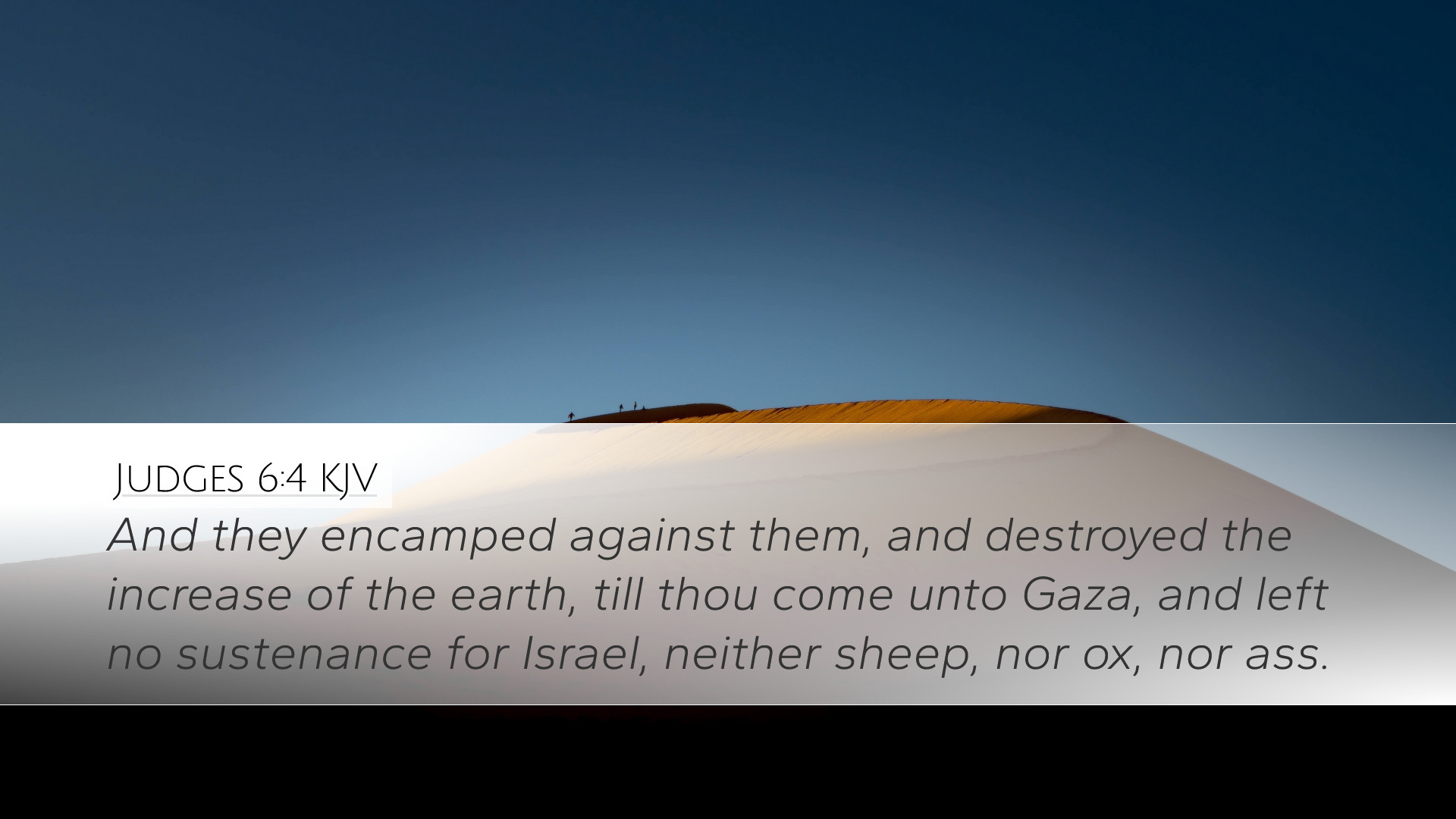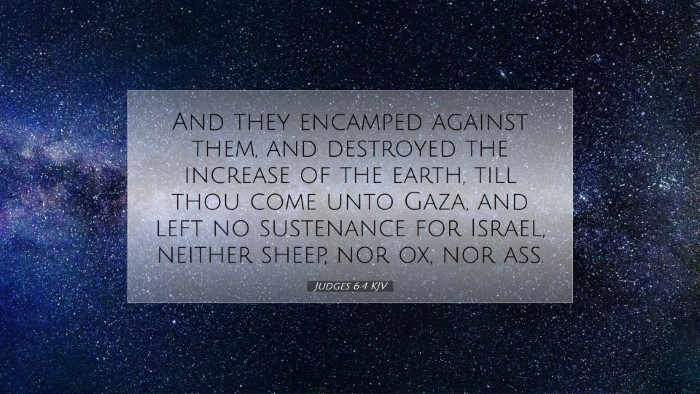Commentary on Judges 6:4
Judges 6:4 states, "They encamped against Israel, and destroyed the increase of the earth, till thou come unto Gaza, and left no sustenance for Israel, neither sheep, nor ox, nor ass." This verse reflects a critical moment in Israel's history during the time of the Judges when the Midianites, as oppressors, devastated the land and stripped it of sustenance.
Contextual Background
Understanding Judges 6:4 necessitates a grasp of the socio-political climate of Israel at the time. After the conquest of Canaan, the Israelites enjoyed periods of peace and prosperity, but these were often interrupted by cycles of apostasy, oppression, and deliverance. The Midianite oppression, described in this chapter, is emblematic of the periods of testing that Israel faced for deviating from God’s commands.
Summary of Commentaries
Matthew Henry’s Commentary
Matthew Henry emphasizes the severity of the Midianite raiding activities, observing that they left no sustenance for Israel. He notes that the oppression was not merely an attack on military forces but a destitution of resources essential for survival. Henry points out that this was a divine chastisement for Israel’s departure from God, illustrating the link between disobedience and suffering. He warns that the absence of resources was not only a physical deprivation but also symbolized a spiritual desolation—the people were deprived of the blessings they once enjoyed.
Adam Clarke’s Commentary
Adam Clarke provides a detailed analysis of the geographical and historical context. He specifies that the Midianites not only camped against Israel but also crossed the Jordan, indicating their aggressive intent. Clarke highlights the implications of this verse for understanding divine justice, where the lack of agricultural produce signifies God’s disfavor due to Israel's sin. He notes the verb “destroyed” reflects a systematic effort to obliterate Israel's ability to sustain itself. Clarke's commentary encourages readers to consider the socio-economic impact of spiritual failure—when a nation turns from God, its prosperity diminishes.
Albert Barnes’ Notes
Albert Barnes expands on the description of the Midianite incursions, stressing the ruthless nature of their raids. He mentions that the Midianites, likely in alliance with other neighboring tribes like the Amalekites, sought to strip the Israelites of all their resources, rendering them powerless. Barnes sees this as God's method of discipline, showing that neglecting God leads to vulnerability against adversaries. His insights serve as a reminder that material prosperity is often a reflection of spiritual fidelity and obedience to divine commandments.
Theological Implications
The situation faced by Israel during the Midianite oppression offers profound theological insight into God’s sovereignty and the nature of human agency.
- Divine Discipline: The oppression serves as a reminder that God disciplines His people to bring them back into alignment with His will.
- The Nature of Sin: The ecological and economic devastation reflects the consequences of sin—not just spiritual but also tangible in societal structures.
- The Hope of Deliverance: Despite their dire situation, this scripture sets the stage for God's call to Gideon, highlighting the theme of redemption integral in the narrative of Judges.
Applicational Insights
For modern-day readers, Judges 6:4 and its commentaries underscore several key applications:
- Dependence on God: In times of personal or communal crisis, believers are encouraged to return to God, acknowledging Him as the ultimate source of sustenance.
- Corporate Responsibility: The passage implies a communal aspect to spiritual faithfulness. The sins of a collective group may lead to shared consequences.
- Restorative Justice: Understanding that hardship may be a precursor to divine intervention serves to instill hope. God often uses difficult circumstances to prepare us for His plan of deliverance.
Conclusion
In summary, Judges 6:4 is a poignant reminder of the interconnectedness of faith, societal conduct, and divine response. Commentaries by Matthew Henry, Adam Clarke, and Albert Barnes provide a deeper understanding of the text, encouraging readers to reflect on their relationship with God and the broader implications of sin and redemption within their communities. The history of Israel serves as a cautionary tale and a source of hope, compelling believers to seek divine guidance and fidelity in their lives.


